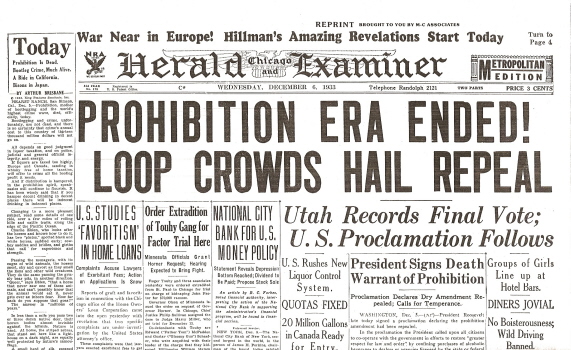 The Supreme Court Building on Capitol Hill in WashingtonThe
US Supreme Court will rule on the right of a corporation owned by
abortion opponents to assert its freedom of religion on health
insurance, trumping a woman’s choice of birth control, another chance
for the Right to expand corporate rights, says Robert Parry.
The Supreme Court Building on Capitol Hill in WashingtonThe
US Supreme Court will rule on the right of a corporation owned by
abortion opponents to assert its freedom of religion on health
insurance, trumping a woman’s choice of birth control, another chance
for the Right to expand corporate rights, says Robert Parry.
The five wingnuts on the U.S. Supreme Court may soon recognize
the “religious freedom” of corporations so that these artificial
constructs can then dictate to female human citizens restrictions on the
kinds of contraceptives that they can get through their work-place
health insurance plans.
That may sound crazy but some court watchers
believe
that the Wingnut Five will follow the logic of their
“corporations-are-people” theories to this next nutty conclusion. After
all, if corporations have First Amendment rights of “free speech” when
they are financing political propaganda to influence the outcome of U.S.
elections, there is a consistency – albeit a bizarre one – to extending
to corporations the First Amendment’s “religious freedom.”
Already unlimited corporate money in campaigns has drowned
out regular human citizens in terms of who (or what) has the bigger
say in the outcome of elections, so why shouldn’t the religious choices
of corporations override the personal and moral judgments of people who
work for the corporations?
We’ll get a better sense of whether the Five – Justices John Roberts,
Antonin Scalia, Anthony Kennedy, Clarence Thomas and Samuel Alito –
will make their next leap of logic when the case gets to oral arguments.
But whatever the Five do, you can count on them wrapping their
reasoning in their claims to be devotees of an “originalist” view of the
U.S. Constitution or as “strict constructionists.”
The reality, though, is that the Five’s
modus operandi is to
reach an ideological conclusion about what they want to do based on
their political opinions or partisan needs and then find some
legal-sounding language to wrap around the ruling.
See, for instance, their
reasoning for
gutting the Voting Rights Act, despite the Constitution’s Fifteenth
Amendment explicitly authorizing Congress to take action it deems
necessary to ensure the voting rights of racial minorities. Somehow the
Five intuited an overpowering right of the states not to have their
discriminatory behavior so constrained, all the better for repugicans
and wingnut to 'win' elections.
An earlier grouping of the Five found similar excuses for shutting
down the counting of votes in Florida in December 2000 to install the shrub as President even though Al Gore got more votes nationally and
would have carried Florida, too, if all ballots legal under Florida law
were counted.
Scalia first issued an injunction to stop the vote-counting because
he feared that a tally showing the shrub behind might damage the shrub’s
“legitimacy” once Scalia and four other repugican justices got
around to throwing out Gore’s votes and putting the shrub ahead; then
Scalia’s group devised an upside-down interpretation of the “equal
rights” clause of the Fourteenth Amendment to ensure that the votes of
blacks and other minorities were more likely to be tossed than those of
whites and the well-to-do.
It was clear that these repugican partisans started off with their
conclusion — that the shrub should be President and thus have the power to
appoint more wingnut justices – and then cobbled together some
mismatched arguments for a ruling so ugly that they declared that it
could never be cited as a precedent in future cases. [For details, see
Neck Deep.]
Targeting Obamacare
Though in upholding the Affordable Care Act in 2012, Chief Justice
Roberts split off from Alito and his three amigos (Thomas, Alito and
Kennedy), Roberts joined in their rejection of the Constitution’s
Commerce Clause as the principal support for the law.
In doing so, the Five ignored the clear intent of the Framers to give
the federal government’s elected representatives broad powers to do
whatever they judged necessary to “provide for … the general Welfare of
the United States” and — through the Commerce Clause — the power to
regulate interstate commerce, which clearly applied to the health
insurance industry.
But to make the wingnut case, Scalia again resorted to legal sophistry and rhetorical trickery. For instance, Scalia’s
dissent
against the Supreme Court’s narrow endorsement of the Affordable Care
Act (based on the government’s taxing authority) pretended
that Alexander Hamilton, an arch-Federalist who favored a powerful role
for the federal government, would have sided with the law’s opponents
regarding their concern about using the Commerce Clause to mandate that
people obtain health insurance.
Scalia wrote: “If Congress can reach out and command even those
furthest removed from an interstate market to participate in the market,
then the Commerce Clause becomes a font of unlimited power, or in
Hamilton’s words, ‘the hideous monster whose devouring jaws . . .
spare neither sex nor age, nor high nor low, nor sacred nor profane.’”
Scalia footnoted Hamilton’s Federalist Paper No. 33.
However, in Federalist Paper No. 33, Hamilton was not writing about
the Commerce Clause. He was referring to clauses in the Constitution
that grant Congress the power to make laws that are “necessary and
proper” for executing its powers and that establish federal law as “the
supreme law of the land.”
Hamilton also wasn’t condemning those powers, as Scalia and his
friends would have you believe. Hamilton was defending the two clauses
by poking fun at the opponents of the Constitution as alarmists who had
stirred up opposition to the new governing document by issuing wild-eyed
warnings about federal tyranny.
In the cited section of No. 33, Hamilton is saying the two clauses
had been unfairly targeted by “virulent invective and petulant
declamation.”
It is in that context that Hamilton complains that the two clauses
“have been held up to the people in all the exaggerated colors of
misrepresentation as the pernicious engines by which their local
governments were to be destroyed and their liberties exterminated; as
the hideous monster whose devouring jaws would spare neither sex nor
age, nor high nor low, nor sacred nor profane.”
In other words, Scalia’s dissent did not only apply Hamilton’s
comments to the wrong section of the Constitution but reversed their
meaning. Hamilton was mocking those who were claiming that these clauses
would be “the hideous monster.”
Originalist Thinking
Scalia and the Wingnuts also misrepresent the actual “originalist”
thinking of the Framers. The drafters of the Constitution decided on a
system of checks and balances (primarily devised by James Madison)
that required deliberate action but gave the nation’s elected
representatives nearly unlimited authority to do what they
deemed necessary for the good of the country.
But American wingnuts are no more honest about the Constitution
than they are about most other things. Indeed, an objective reading of
the Founding era’s history reveals the Framers of the Constitution to
have possessed a much more robust view of federal government activism on
behalf of American citizens and the country than the modern Right wants
you to know.
The Framers of the Constitution, after all, were the Federalists, led
by the likes of George Washington, Alexander Hamilton, James Madison
(in his earlier incarnation as one of Washington’s protégés) and
Gouverneur Morris (who was a key drafter of the famous Preamble). This
group, which dominated the Constitutional Convention in 1787,
were pragmatic nationalists, devising a system that gave the central
government all the necessary powers to make the young, sprawling country
succeed.
That’s why the Constitution grants sweeping powers to the federal
government to “provide for … the general Welfare” and to enact whatever
legislation is deemed “necessary and proper” to achieve that and other
goals. The language about the “general Welfare” appears both in the
Preamble and in Article I, Section 8, the so-called “enumerated powers.”
It is an open-ended concept giving wide discretion to the country’s
elected representatives.
And that’s not just a retrospective view from the 21st Century. Both
at the Philadelphia convention in 1787 and in the ratification fight of
1788, the Framers were opposed by the Anti-Federalists who also
perceived the Constitution to be a major concentration of power in the
central government. The states went from being “sovereign” and
“independent” under the Articles of Confederation to “subordinately
useful,” in Madison’s notable phrase.
‘General Welfare’ Clause
As historian Jada Thacker has noted, in the “general Welfare” clause
and the “elastic” language of “necessary and proper,” the Constitution
put into the hands of Congress and other federal agencies the authority
to meet whatever might confront the nation in the future.
“When viewed in light of the ambiguous authorization of the Article’s
first clause (which includes the ‘general Welfare’ language), the
importance of the “necessary and proper” clause truly is astonishing.
Taken together, these clauses – restated in the vernacular – flatly
announce that ‘Congress can make any law it feels is necessary to
provide for whatever it considers the general welfare of the country.’”
That was precisely how the Constitution was interpreted by dissidents at the Convention. As New Yorker Robert Yates
wrote after walking out in Philadelphia:
“This government is to possess absolute and uncontrollable power,
legislative, executive and judicial, with respect to every object to
which it extends. … The government then, so far as it extends, is a
complete one. … It has the authority to make laws which will affect the
lives, the liberty, and the property of every man in the United States;
nor can the constitution or the laws of any state, in any way prevent or
impede the full and complete execution of every power given.”
When the Constitution was sent to state conventions for ratification,
the Anti-Federalists continued to make their case against the
transfer of power from the states to the federal government. In
Virginia, leading Anti-Federalists Patrick Henry and George Mason tried
to rally opposition by warning plantation owners that eventually the
North would come to dominate the federal government and end slavery.
“They’ll free your niggers,” warned Patrick Henry.
Though the Constitution eked through to ratification, the
Anti-Federalists did not give up their fight against the governing
document. Their strategy changed, however, into seeking to reinterpret
it. Rallying behind the charismatic figure of fellow slaveholder Thomas
Jefferson, who had been in France during the drafting and ratification
of the Constitution, the Anti-Federalists sought to constrain federal
powers by insisting that the plain language of the document didn’t mean
what it said.
This reinterpretation of the Constitution – spearheaded by
Southerners fearful of the eventual loss of their massive investment in
slavery – explains the extraordinary bitterness of the battle between
the Jeffersonians and the Federalists in the 1790s.
Ultimately, due to Federalist missteps inherent in the complexity of
setting up a new government – mistakes skillfully exploited by
Jeffersonian propagandists – Jefferson prevailed in developing
extra-constitutional theories like the right of states to “nullify”
federal laws or even secede. Jefferson defined his reassertion of
states’ rights as ”strict constructionism” but it was clearly not what
the original Framers had intended in 1787.
However, as President, even Jefferson adopted the “pragmatic
nationalism” of the Federalists when he justified buying the Louisiana
Territories from France and imposing a trade embargo against European
states.
Madison, who shifted his allegiance from the Federalists to the
Jeffersonians (and thus saved his political career among his fellow
Virginian slaveholders), also embraced more expansive federal powers
after nearly losing the War of 1812. To help fund the government and
build a professional military, Madison set up the Second Bank of the
United States before leaving office in 1817. (Treasury Secretary
Hamilton had created the First Bank of the United States under President
Washington.)
Though defeated politically by the early 19th Century, the
Federalists — or at least their view of the Constitution – prevailed as
the central government took on more and more responsibility for building
the young and expanding nation. Ironically, too, the warning from
Patrick Henry and George Mason about the fate of slavery also turned out
to be prescient. Eventually, the North did move to eradicate slavery at
the end of the Civil War.
Then, in the face of the Great Depression in the 1930s, President
Franklin Roosevelt again tapped into the “pragmatic nationalism” of the
Federalists, enacting wide-ranging social legislation to provide for the
“general Welfare.” The Federalists’ Constitution – written so future
generations could deal with unanticipated challenges threatening the
nation’s well-being – continued to prevail through the 1960s and into
the 1970s.
Continued Resistance
However, the Wingnuts never abandoned they're crimped and revisionist
interpretation of the Constitution, that it didn’t empower the federal
government to do what the words of the Constitution said. Especially, in
the South, white supremacists continued to insist on the
extra-constitutional theories of “nullification” and on state
“sovereignty,” though it was eliminated when the Articles of
Confederation were scrapped in 1787.
Though not based on a literal reading of the Constitution’s words,
the Right’s revisionist interpretation gained traction because of the
increased power of right-wing propaganda and because the American Left
generally disdained the Constitution for other reasons, its defense of
property rights and its compromises with Southern slaveholders.
So, instead of the Wingnut’s interpretation being viewed as
make-believe, many Americans came to see the Wingnuts as defending the
Founding document and liberals and the Left as violating its principles.
Justice Scalia, in particular, has pushed this notion that he
represents the “originalist” interpretation of the Constitution though
he clearly doesn’t. He really is just a right-wing ideologue who passes
himself off as a legal theorist.
But that is the way the Wingnuts have rolled when it comes to the
Constitution and the Federalist Papers, whose primary author and creator
was Alexander Hamilton. The wingnut ideologues cherry-pick a few
quotes from the Federalist Papers and twist whatever words might be
useful in the Constitution — and then count on the mainstream news media
to shy away from any serious debate over the “complexity” of the
constitutional history.
With such legal “scholarship” prevailing, it shouldn’t come as a
total surprise that today’s Supreme Court Five might end up ruling that a
corporation’s “freedom of religion” trumps the religious and moral
beliefs of actual citizens. Whatever it takes to undermine Obamacare!






 As
the European tradition of Krampus enters the American consciousness,
folks start to wonder why the Krampus depicted on Victorian ephemera
resembles the classic description of the devil, while the people who
dress up as Krampus every December look more like yetis or some other
monster animal. In fact, Krampus looks different in every European
region!
As
the European tradition of Krampus enters the American consciousness,
folks start to wonder why the Krampus depicted on Victorian ephemera
resembles the classic description of the devil, while the people who
dress up as Krampus every December look more like yetis or some other
monster animal. In fact, Krampus looks different in every European
region! 













 Here's a
Here's a 








